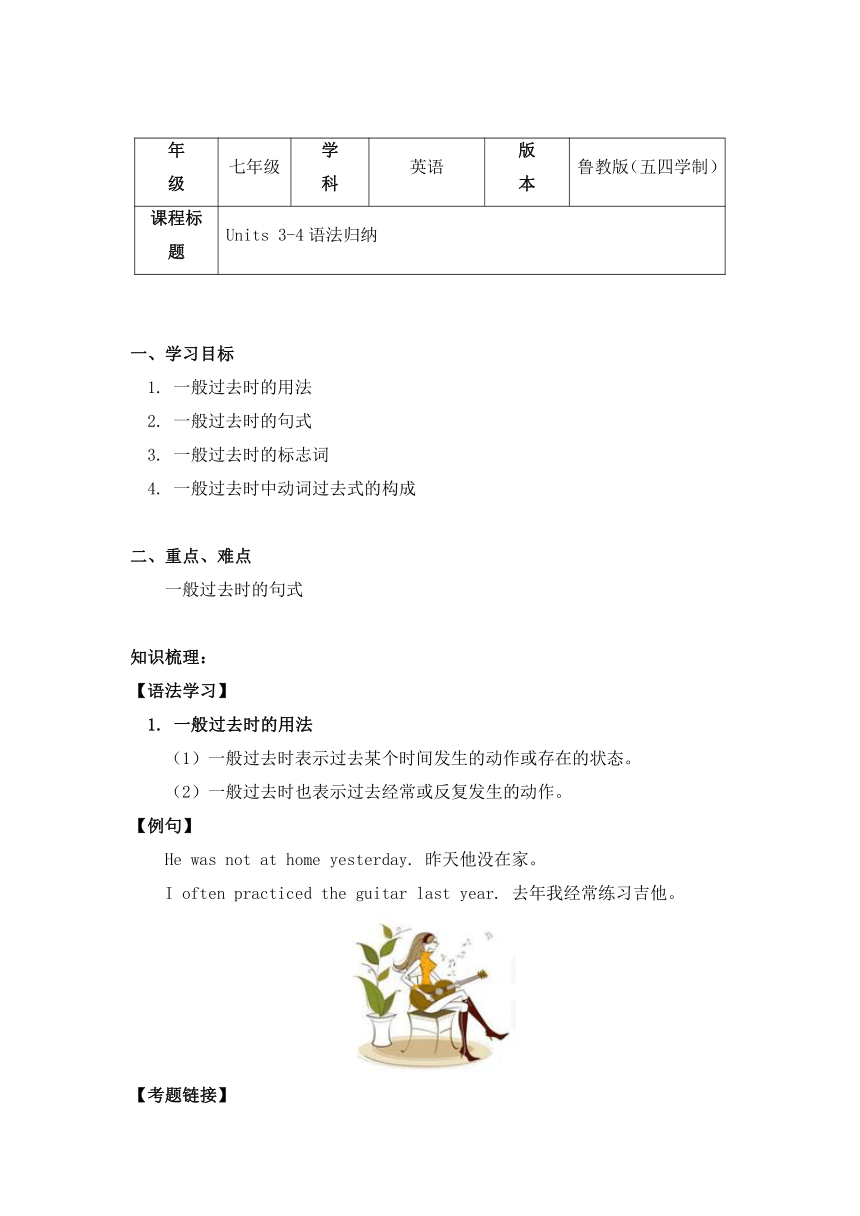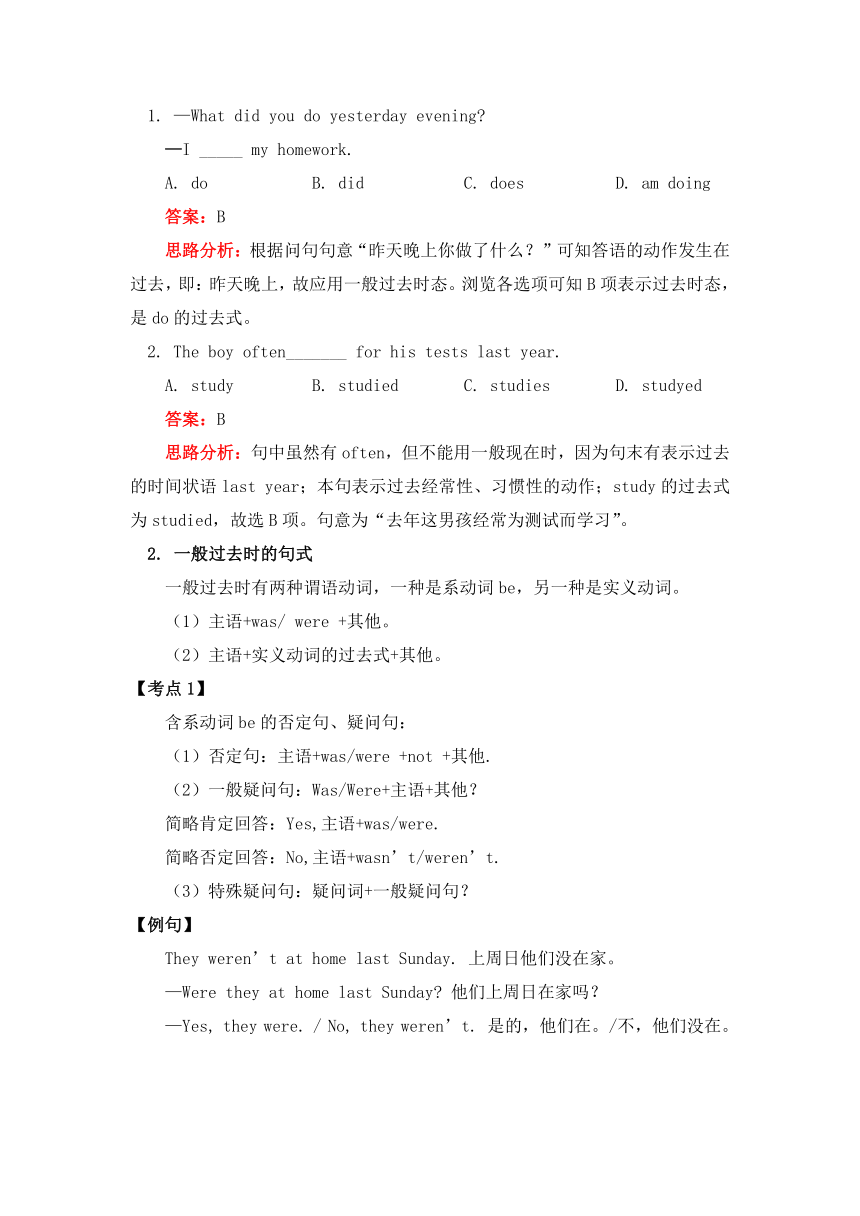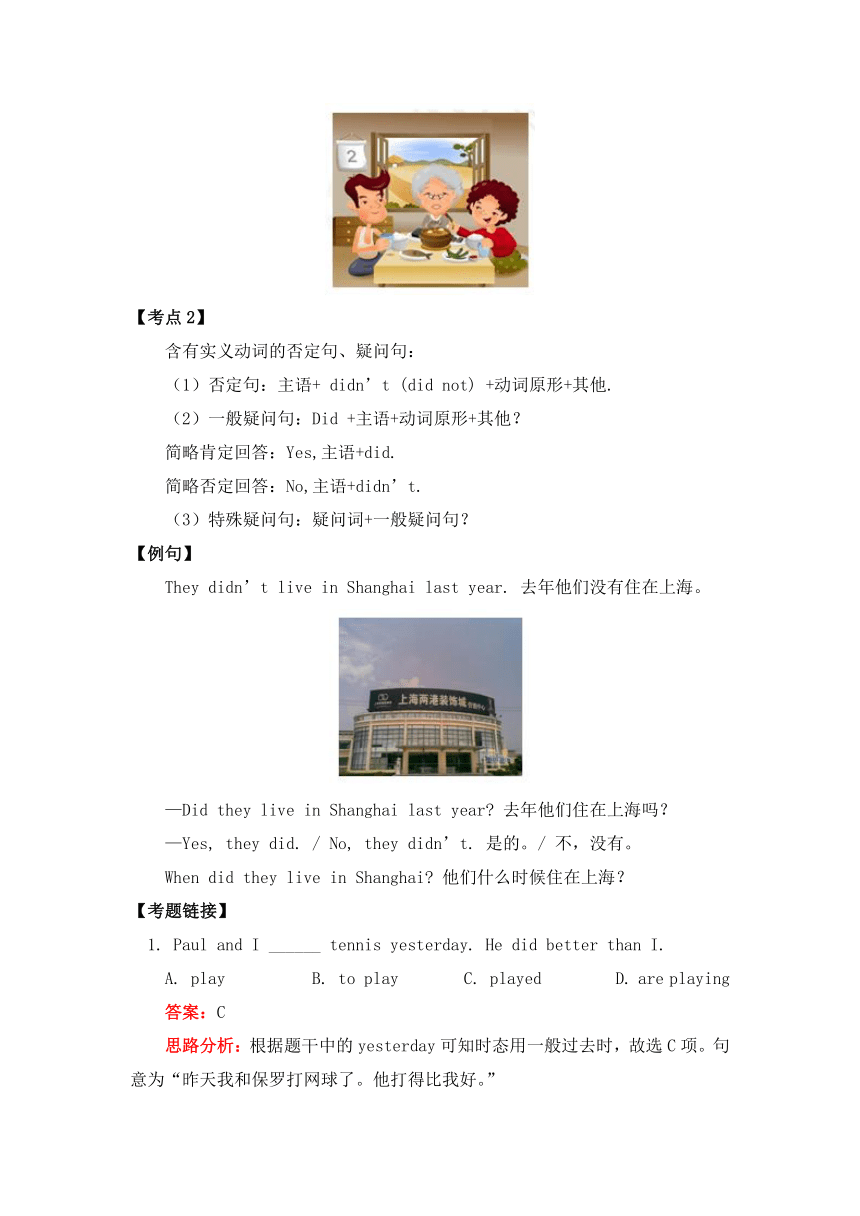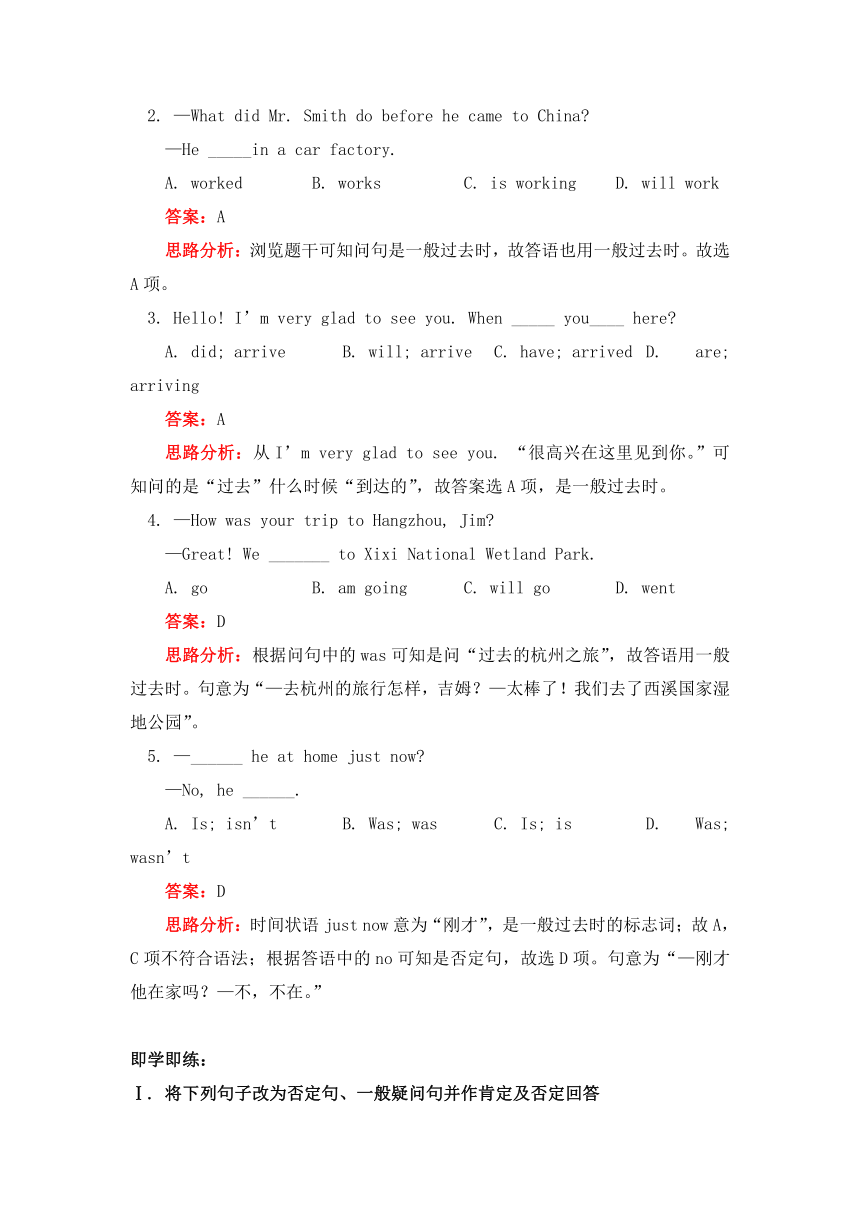英语七年级上册Units 3-4语法归纳-导学案-鲁教版(五四学制)
文档属性
| 名称 | 英语七年级上册Units 3-4语法归纳-导学案-鲁教版(五四学制) |  | |
| 格式 | doc | ||
| 文件大小 | 237.5KB | ||
| 资源类型 | 教案 | ||
| 版本资源 | 鲁教版 | ||
| 科目 | 英语 | ||
| 更新时间 | 2020-09-30 22:00:57 | ||
图片预览




文档简介
年 级 七年级 学 科 英语 版 本 鲁教版(五四学制)
课程标题 Units 3-4语法归纳
一、学习目标
1. 一般过去时的用法
2. 一般过去时的句式
3. 一般过去时的标志词
4. 一般过去时中动词过去式的构成
二、重点、难点
一般过去时的句式
知识梳理:
【语法学习】
1. 一般过去时的用法
(1)一般过去时表示过去某个时间发生的动作或存在的状态。
(2)一般过去时也表示过去经常或反复发生的动作。
【例句】
He was not at home yesterday. 昨天他没在家。
I often practiced the guitar last year. 去年我经常练习吉他。
【考题链接】
1. —What did you do yesterday evening?
—I _____ my homework.
A. do B. did C. does D. am doing
答案:B
思路分析:根据问句句意“昨天晚上你做了什么?”可知答语的动作发生在过去,即:昨天晚上,故应用一般过去时态。浏览各选项可知B项表示过去时态,是do的过去式。
2. The boy often_______ for his tests last year.
A. study B. studied C. studies D. studyed
答案:B
思路分析:句中虽然有often,但不能用一般现在时,因为句末有表示过去的时间状语last year;本句表示过去经常性、习惯性的动作;study的过去式为studied,故选B项。句意为“去年这男孩经常为测试而学习”。
2. 一般过去时的句式
一般过去时有两种谓语动词,一种是系动词be,另一种是实义动词。
(1)主语+was/ were +其他。
(2)主语+实义动词的过去式+其他。
【考点1】
含系动词be的否定句、疑问句:
(1)否定句:主语+was/were +not +其他.
(2)一般疑问句:Was/Were+主语+其他?
简略肯定回答:Yes,主语+was/were.
简略否定回答:No,主语+wasn’t/weren’t.
(3)特殊疑问句:疑问词+一般疑问句?
【例句】
They weren’t at home last Sunday. 上周日他们没在家。
—Were they at home last Sunday? 他们上周日在家吗?
—Yes, they were. / No, they weren’t. 是的,他们在。/不,他们没在。
【考点2】
含有实义动词的否定句、疑问句:
(1)否定句:主语+ didn’t (did not) +动词原形+其他.
(2)一般疑问句:Did +主语+动词原形+其他?
简略肯定回答:Yes,主语+did.
简略否定回答:No,主语+didn’t.
(3)特殊疑问句:疑问词+一般疑问句?
【例句】
They didn’t live in Shanghai last year. 去年他们没有住在上海。
—Did they live in Shanghai last year? 去年他们住在上海吗?
—Yes, they did. / No, they didn’t. 是的。/ 不,没有。
When did they live in Shanghai? 他们什么时候住在上海?
【考题链接】
1. Paul and I ______ tennis yesterday. He did better than I.
A. play B. to play C. played D. are playing
答案:C
思路分析:根据题干中的yesterday可知时态用一般过去时,故选C项。句意为“昨天我和保罗打网球了。他打得比我好。”
2. —What did Mr. Smith do before he came to China?
—He _____in a car factory.
A. worked B. works C. is working D. will work
答案:A
思路分析:浏览题干可知问句是一般过去时,故答语也用一般过去时。故选A项。
3. Hello! I’m very glad to see you. When _____ you____ here?
A. did; arrive B. will; arrive C. have; arrived D. are; arriving
答案:A
思路分析:从I’m very glad to see you. “很高兴在这里见到你。”可知问的是“过去”什么时候“到达的”,故答案选A项,是一般过去时。
4. —How was your trip to Hangzhou, Jim?
—Great! We _______ to Xixi National Wetland Park.
A. go B. am going C. will go D. went
答案:D
思路分析:根据问句中的was可知是问“过去的杭州之旅”,故答语用一般过去时。句意为“—去杭州的旅行怎样,吉姆?—太棒了!我们去了西溪国家湿地公园”。
5. —______ he at home just now?
—No, he ______.
A. Is; isn’t B. Was; was C. Is; is D. Was; wasn’t
答案:D
思路分析:时间状语just now意为“刚才”,是一般过去时的标志词;故A,C项不符合语法;根据答语中的no可知是否定句,故选D项。句意为“—刚才他在家吗?—不,不在。”
即学即练:
Ⅰ. 将下列句子改为否定句、一般疑问句并作肯定及否定回答
1. Nancy was in the zoo yesterday morning.
否定句:_____________________________
一般疑问句:_________________________
肯定及否定回答:____________________
2. I did my homework last night.
否定句:_____________________________
一般疑问句:_________________________
肯定及否定回答:____________________
答案:
1. Nancy wasn’t in the zoo yesterday morning.
Was Nancy in the zoo yesterday morning?
Yes, she was. / No, she wasn’t.
2. I didn’t do my homework last night.
Did you do your homework last night?
Yes, I did. / No, I didn’t.
Ⅱ. 句型转换
1. Sally was with her friend last night. (改为否定句)
Sally _____ _____with her friend last night.
2. Frank read an interesting book about history. (改为一般疑问句)
______ Frank ______an interesting book about history?
3. Thomas spent 10 yuan on this book. (改为否定句)
Thomas _____ _____10 yuan on this book.
4. Did he study English well? (改为陈述句)
He _____ English well.
5. My family went to the beach last week. (对画线部分提问)
_____ _____ _____family _____last week?
答案:
1. was not 2. Did; read 3. didn’t spend 4. studied 5. Where did your; go
【考点3】
一般过去时中动词过去式的构成:
(1)规则变化
变化规则 例词 读音
一般直接在动词词尾加-ed。 work → worked 清辅音后面读/t/;
元音、浊辅音后面读/d/;
/t/, /d/后面读作/?d/。
以不发音的e结尾的动词,在词尾加-d。 use → used
以辅音字母加y结尾的动词,先变y为i,再加-ed。 worry → worried
末尾只有一个辅音字母的重读闭音节词,先双写这个辅音字母,再加-ed。 stop → stopped
(2)不规则变化
不规则动词无一定的变化规则,需要加强记忆不规则动词的过去式表。
buy → bought; find → found; sing → sang
【例句】
I stopped to have a rest. 我停下来去休息。
He drove to work yesterday. 昨天他开车上的班。
【考题链接】
1. He _____ a book but I cleaned the room.
A. read B. reads C. reading D. to read
答案:A
思路分析:but连接并列句,后句用的是动词的过去式,故前半部分也用动词的过去式;read的过去式形式为read。故选A项。
2. We were in Beijing last week and _____ great fun there.
A. will have B. have C. has D. had
答案:D
思路分析:last week意为“上周”,时态应用一般过去时;have的过去式为had,故选D项。
【考点4】
一般过去时的标志词:
(1) yesterday(morning, evening, afternoon), the day before yesterday等。
(2) last year( month, term, week, night)等。
(3) two days ago, a moment ago(just now), three years ago 等。
(4) in +表示过去的时间点:in 2011等。
【例句】
Yesterday afternoon they played football. 昨天下午他们踢足球了。
They moved to Jinan in 2010. 在2010年他们搬到济南去了。
【考题链接】
1. —______ last year?
—I was 13.
A. How old are you B. How old you are
C. How old were you D. How old you were
答案:C
思路分析:根据答语“我13岁”可知问句询问“你去年多大”?特殊疑问句由特殊疑问词+一般疑问句构成,故排除B,D两项;根据last year可知时态用一般过去时,排除A项。
2. She _____ a letter to her friend yesterday.
A. write B. wrote C. writed D. writes
答案:B
思路分析:根据yesterday可知时态用一般过去时;write的过去式为wrote,故选B项。
同步练习:
用括号中所给动词的适当形式填空
1. My father and I ______(visit) Uncle Wang last Saturday.
2. —Where did you go?
—I _____(go) to the mountains.
3. We _____(be) happy to see my friend yesterday.
4. John often ______(do) his homework in the evening last month.
5. —How was your weekend, Jack?
—It _____(be) boring.
6. Tina ______(buy) a new dictionary 2 days ago.
7. My mother _____(wake) me up just now.
8. It _____(be) sunny and hot last week.
9. The boys ______(fly) kites last Sunday afternoon.
10. My sister often ______(read) books in the morning. But now she ______(read).
答案:1. visited 2. went 3. were 4. did 5. was 6. bought
7. woke 8. was 9. flew 10. reads; is reading
课程标题 Units 3-4语法归纳
一、学习目标
1. 一般过去时的用法
2. 一般过去时的句式
3. 一般过去时的标志词
4. 一般过去时中动词过去式的构成
二、重点、难点
一般过去时的句式
知识梳理:
【语法学习】
1. 一般过去时的用法
(1)一般过去时表示过去某个时间发生的动作或存在的状态。
(2)一般过去时也表示过去经常或反复发生的动作。
【例句】
He was not at home yesterday. 昨天他没在家。
I often practiced the guitar last year. 去年我经常练习吉他。
【考题链接】
1. —What did you do yesterday evening?
—I _____ my homework.
A. do B. did C. does D. am doing
答案:B
思路分析:根据问句句意“昨天晚上你做了什么?”可知答语的动作发生在过去,即:昨天晚上,故应用一般过去时态。浏览各选项可知B项表示过去时态,是do的过去式。
2. The boy often_______ for his tests last year.
A. study B. studied C. studies D. studyed
答案:B
思路分析:句中虽然有often,但不能用一般现在时,因为句末有表示过去的时间状语last year;本句表示过去经常性、习惯性的动作;study的过去式为studied,故选B项。句意为“去年这男孩经常为测试而学习”。
2. 一般过去时的句式
一般过去时有两种谓语动词,一种是系动词be,另一种是实义动词。
(1)主语+was/ were +其他。
(2)主语+实义动词的过去式+其他。
【考点1】
含系动词be的否定句、疑问句:
(1)否定句:主语+was/were +not +其他.
(2)一般疑问句:Was/Were+主语+其他?
简略肯定回答:Yes,主语+was/were.
简略否定回答:No,主语+wasn’t/weren’t.
(3)特殊疑问句:疑问词+一般疑问句?
【例句】
They weren’t at home last Sunday. 上周日他们没在家。
—Were they at home last Sunday? 他们上周日在家吗?
—Yes, they were. / No, they weren’t. 是的,他们在。/不,他们没在。
【考点2】
含有实义动词的否定句、疑问句:
(1)否定句:主语+ didn’t (did not) +动词原形+其他.
(2)一般疑问句:Did +主语+动词原形+其他?
简略肯定回答:Yes,主语+did.
简略否定回答:No,主语+didn’t.
(3)特殊疑问句:疑问词+一般疑问句?
【例句】
They didn’t live in Shanghai last year. 去年他们没有住在上海。
—Did they live in Shanghai last year? 去年他们住在上海吗?
—Yes, they did. / No, they didn’t. 是的。/ 不,没有。
When did they live in Shanghai? 他们什么时候住在上海?
【考题链接】
1. Paul and I ______ tennis yesterday. He did better than I.
A. play B. to play C. played D. are playing
答案:C
思路分析:根据题干中的yesterday可知时态用一般过去时,故选C项。句意为“昨天我和保罗打网球了。他打得比我好。”
2. —What did Mr. Smith do before he came to China?
—He _____in a car factory.
A. worked B. works C. is working D. will work
答案:A
思路分析:浏览题干可知问句是一般过去时,故答语也用一般过去时。故选A项。
3. Hello! I’m very glad to see you. When _____ you____ here?
A. did; arrive B. will; arrive C. have; arrived D. are; arriving
答案:A
思路分析:从I’m very glad to see you. “很高兴在这里见到你。”可知问的是“过去”什么时候“到达的”,故答案选A项,是一般过去时。
4. —How was your trip to Hangzhou, Jim?
—Great! We _______ to Xixi National Wetland Park.
A. go B. am going C. will go D. went
答案:D
思路分析:根据问句中的was可知是问“过去的杭州之旅”,故答语用一般过去时。句意为“—去杭州的旅行怎样,吉姆?—太棒了!我们去了西溪国家湿地公园”。
5. —______ he at home just now?
—No, he ______.
A. Is; isn’t B. Was; was C. Is; is D. Was; wasn’t
答案:D
思路分析:时间状语just now意为“刚才”,是一般过去时的标志词;故A,C项不符合语法;根据答语中的no可知是否定句,故选D项。句意为“—刚才他在家吗?—不,不在。”
即学即练:
Ⅰ. 将下列句子改为否定句、一般疑问句并作肯定及否定回答
1. Nancy was in the zoo yesterday morning.
否定句:_____________________________
一般疑问句:_________________________
肯定及否定回答:____________________
2. I did my homework last night.
否定句:_____________________________
一般疑问句:_________________________
肯定及否定回答:____________________
答案:
1. Nancy wasn’t in the zoo yesterday morning.
Was Nancy in the zoo yesterday morning?
Yes, she was. / No, she wasn’t.
2. I didn’t do my homework last night.
Did you do your homework last night?
Yes, I did. / No, I didn’t.
Ⅱ. 句型转换
1. Sally was with her friend last night. (改为否定句)
Sally _____ _____with her friend last night.
2. Frank read an interesting book about history. (改为一般疑问句)
______ Frank ______an interesting book about history?
3. Thomas spent 10 yuan on this book. (改为否定句)
Thomas _____ _____10 yuan on this book.
4. Did he study English well? (改为陈述句)
He _____ English well.
5. My family went to the beach last week. (对画线部分提问)
_____ _____ _____family _____last week?
答案:
1. was not 2. Did; read 3. didn’t spend 4. studied 5. Where did your; go
【考点3】
一般过去时中动词过去式的构成:
(1)规则变化
变化规则 例词 读音
一般直接在动词词尾加-ed。 work → worked 清辅音后面读/t/;
元音、浊辅音后面读/d/;
/t/, /d/后面读作/?d/。
以不发音的e结尾的动词,在词尾加-d。 use → used
以辅音字母加y结尾的动词,先变y为i,再加-ed。 worry → worried
末尾只有一个辅音字母的重读闭音节词,先双写这个辅音字母,再加-ed。 stop → stopped
(2)不规则变化
不规则动词无一定的变化规则,需要加强记忆不规则动词的过去式表。
buy → bought; find → found; sing → sang
【例句】
I stopped to have a rest. 我停下来去休息。
He drove to work yesterday. 昨天他开车上的班。
【考题链接】
1. He _____ a book but I cleaned the room.
A. read B. reads C. reading D. to read
答案:A
思路分析:but连接并列句,后句用的是动词的过去式,故前半部分也用动词的过去式;read的过去式形式为read。故选A项。
2. We were in Beijing last week and _____ great fun there.
A. will have B. have C. has D. had
答案:D
思路分析:last week意为“上周”,时态应用一般过去时;have的过去式为had,故选D项。
【考点4】
一般过去时的标志词:
(1) yesterday(morning, evening, afternoon), the day before yesterday等。
(2) last year( month, term, week, night)等。
(3) two days ago, a moment ago(just now), three years ago 等。
(4) in +表示过去的时间点:in 2011等。
【例句】
Yesterday afternoon they played football. 昨天下午他们踢足球了。
They moved to Jinan in 2010. 在2010年他们搬到济南去了。
【考题链接】
1. —______ last year?
—I was 13.
A. How old are you B. How old you are
C. How old were you D. How old you were
答案:C
思路分析:根据答语“我13岁”可知问句询问“你去年多大”?特殊疑问句由特殊疑问词+一般疑问句构成,故排除B,D两项;根据last year可知时态用一般过去时,排除A项。
2. She _____ a letter to her friend yesterday.
A. write B. wrote C. writed D. writes
答案:B
思路分析:根据yesterday可知时态用一般过去时;write的过去式为wrote,故选B项。
同步练习:
用括号中所给动词的适当形式填空
1. My father and I ______(visit) Uncle Wang last Saturday.
2. —Where did you go?
—I _____(go) to the mountains.
3. We _____(be) happy to see my friend yesterday.
4. John often ______(do) his homework in the evening last month.
5. —How was your weekend, Jack?
—It _____(be) boring.
6. Tina ______(buy) a new dictionary 2 days ago.
7. My mother _____(wake) me up just now.
8. It _____(be) sunny and hot last week.
9. The boys ______(fly) kites last Sunday afternoon.
10. My sister often ______(read) books in the morning. But now she ______(read).
答案:1. visited 2. went 3. were 4. did 5. was 6. bought
7. woke 8. was 9. flew 10. reads; is reading
同课章节目录
- Unit 1 What does he look like?
- Section A
- Section B
- Unit 2 I'd like some noodles.
- Section A
- Section B
- Unit 3 How was your school trip?
- Section A
- Section B
- Unit 4 What did you do last weekend?
- Section A
- Section B
- Unit 5 Where did you go on vacation?
- Section A
- Section B
- Unit 6 How often do you exercise?
- Section A
- Section B
- Unit 7 I'm more outgoing than my sister.
- Section A
- Section B
- Unit 8 What's the best movie theater?
- Section A
- Section B
